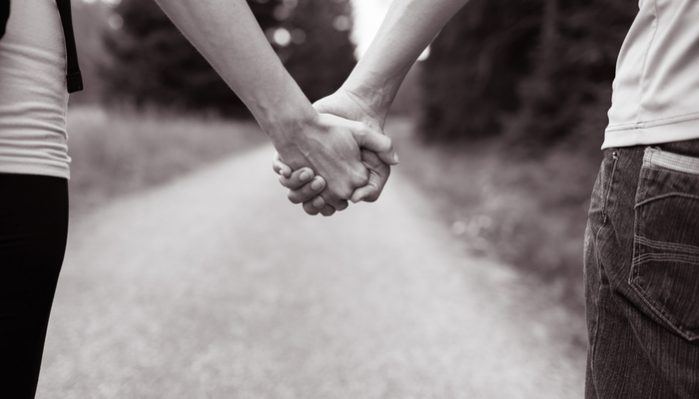It’s hard to admit that you’re in a toxic relationship, let alone identify the toxicity of the relationship in the first place. When you’re in it day after day, it’s hard to see it for what it truly is from the outside. Physical abuse appears on our skin, verbal abuse is easily identifiable too, but emotional abuse by a toxic partner is harder to pin down.
Emotional abuse can be anything from gaslighting to withholding affection. In this article, we’ll provide you with some examples of what a toxic partner might do as well as a stunning tweet that clearly shows the difference between a toxic partner and a loving, healthy partner.
Understanding emotional abuse

Emotional abuse is hard to see because the scars are psychological – they live on the outside and don’t always surface in ways that we can really understand. One twitter user did an excellent job of portraying abnormal, unhealthy, emotionally abusive behavior in a partner juxtaposed to healthy, normal behavior.
Healthy vs. unhealthy relationships in one tweet

No relationship is perfect and everyone has bad moments, but twitter user @MaycPeterson2 took to twitter in August of 2017 to show the difference between two people, what they call the “difference between a boy and a man.” The text from the left is from an ex-partner, the one on the right is from their current partner. The difference is pretty clear.
Difference between a boy and a man. pic.twitter.com/2iwE9jDEKY
— Mayc (@MaycPeterson2) August 8, 2018
The text messages from the person on the left are super jealous, withholding, and awful. They assume that just because their partner is out enjoying themselves, they need to be told to “try not to cheat,” like it’s an impulse that @MaycPeterson2 would have trouble resisting.
The texts on the right paint a radically different picture – one of a partner who is kind, caring, compassionate, non-possessive, and mostly interested in the safety of the person they love.
How long-term emotional abuse effects you
The effects of long-term emotional abuse can cause severe psychological trauma to a person. Victims start experiencing feelings of depression, anxiety, chronic pain, and in most cases suffer from post-traumatic stress disorders and substance abuse issues.
If you aren’t sure what constitutes as emotional abuse, read the list of subtle warning signs from a toxic partner versus the signs of a healthy partner:
How to Spot a Toxic Partner
Toxic and non-toxic people aren’t a monolith. Bad behavior can be obvious or subtle. It can vary widely from person to person. But generally, these are the cues you should be looking for in a toxic partner.
1. Their jealousy interferes with your life
Jealousy is not the most attractive emotion for a person to have but it’s not uncommon and not abnormal. Everyone feels a pang of jealousy now and then. But if your partner’s jealousy interferes with your life, like being able to visit your family, spend time with your friends, or hold down a job, then it starts bordering on abuse. You, as an individual, should feel free to pursue work and recreation without having a toxic partner making their jealousy your problem.
If your partner snoops on your personal device, monitors your activity, or tries to prevent you from doing the things that you love that clearly wouldn’t have a negative impact on the romantic part of your life, you may be dealing with a toxic partner.
2. You’re always treading thin ice
Everyone becomes upset with their partner sometimes. It just happen.s Sometimes we say things that hurt or touch a nerve. But if you find yourself really carefully choosing your words because you fear it may make your partner blow up, or simply not bringing things up that are important to you because you fear an intensely negative reaction, you could be seeing another trait of a toxic partner.
3. Gaslighting and blaming
Sometimes we become angry about something only to learn that we’re in the wrong. We may have, in our haste to reach a conclusion that feels right, contrived a situation that wasn’t happening or assumed something about our partner that wasn’t true. But have you ever been with someone, known someone, or worked with someone who every time you raised a legitimate problem, you walked away feeling like you were the one in the wrong?
Gaslighting is difficult to pin down because it is an attempt to change how you view an entirely verifiable reality. So if the gaslighting is successful, their fake reality feels like your real reality.
4. Withholding affection and sex
If you have had a serious fight with a partner, something that can be common and constructive, you may not be feeling super snuggly or ready to hop into bed in the immediate aftermath. That’s normal. What isn’t normal is you making choices for yourself and your life that have little to do with your partner that results in withholding behavior.
If, for example, you go to visit your mother for the day or pal around with some friends for an afternoon against your partner’s wishes and they get physically or emotionally distant, that is not normal. It’s a toxic behavior intended to make you not want to do those things anymore. It’s all a manipulation.
5. Your partner physically or verbally abuses you
Here’s the line in the sand. If your partner strikes you, that is the end of your relationship. Escaping an abuser is sometimes dangerous, but there simply is no coming back from a physical altercation like that. Similar with verbal abuse – if your partner verbally crosses that line in the sand where they’re demeaning you, diminishing you, putting you down, or screaming in your face, the relationship is likely over. These behaviors are toxic and unacceptable.
These are 5 things I think it’s important to watch out for in a toxic partner, but I’d be doing you a disservice if I didn’t talk about healthy partnerships as well.
How to Spot a Healthy Partner

1. Every day flows, nothing feels forced
You don’t feel imbalanced or feel like you’re doing things against your will in the relationship. Your partner doesn’t pressure you with things like having sex, living together, getting married, having a baby, spending time with them, choosing them over friends, etc.
2. You feel free to be yourself and communicate
In a truly healthy partnership, you should feel as though you can be the person you truly are and communicate freely and openly. If your partner seems to always have a door open for you and an ear ready to listen to you, that’s the sign that you’ve caught yourself a good one worth keeping!
3. Your partner values the person you are
You partner values your beliefs, opinions and who you are as an individual. They compliment you, support you, and do not violate your boundaries.
4. You are allowed to do your thing without mistrust
You and your partner put equal effort into the relationship (as opposed to one person calling all the shots). You feel heard in your relationship and are comfortable speaking up. You make decisions together and make compromises together.
5. Life is joyful and you get what you need
Your partner is consistently and genuinely kind to you. Not only when they want something or if they happen to be in a good mood. If you are going through a hard time, they will try to understand and be there for you.
What to do if you’re being emotionally abused

If you think that you are in an abusive relationship and aren’t sure what to do, or if you think someone you love might be at risk of being abused, there are resources for you to find help.
The National Domestic Violence Hotline at 800-799-7233 or 800-787-3224 (TTY) provides 24/7 confidential support..
Stop Abuse For Everyone (SAFE) helps straight men, LGBTQIA+ people, teens, and elderly people who face domestic violence.
Lastly, Crisis Text Line is a confidential resource available 24/7. All you have to do is text HOME to 741741 from anywhere in the U.S. and you will be connected with a trained counselor.
For residents in Canada, please check out this link: http://www.ementalhealth.ca/Ontario/Abuse-and-Domestic-Violence/index.php?m=article&ID=8920
And remember: You are not alone in this, help is always available to you.
Sources:


